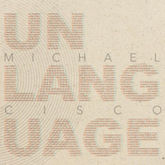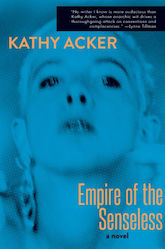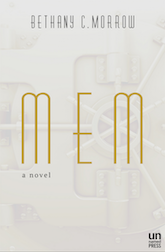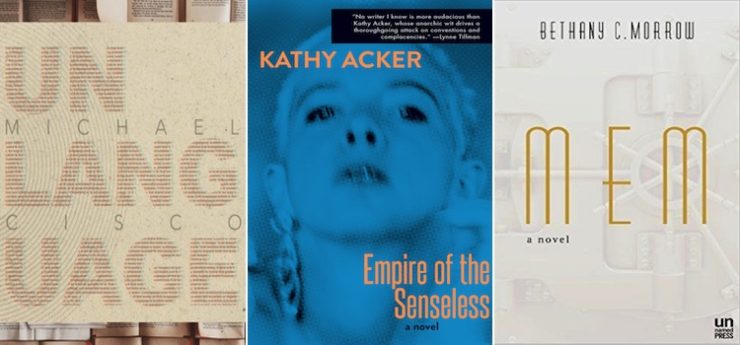The nature of identity is at the heart of an abundance of speculative fiction. It can be one of the best ways of exploring what makes a person unique and what sits at the heart of a particular person’s identity. In some fiction, this can be approached via heated philosophical discussion or rich metaphors; in the realm of science fiction and speculative fiction, these questions can be approached far more literally.
This year has brought with it a trio of books—two new, one in a new edition—that use surreal and speculative takes on memory and language to explore fundamental questions about the nature of humanity. The imagery and language in these books sizzles with uncanny takes on the nature of life and consciousness, but as far from the mundane as they go, their concerns remain deeply rooted in primal anxieties. Who are we? What makes us us? Is there a certain point beyond which I might become someone else, or forever lose my sense of selfhood?
Buy the Book


Unlanguage
As befits explorations of the body and the self, this process is a deeply visceral one. Michael Cisco’s novel Unlanguage is initially structured in a manner akin to a textbook, each unit taking on a different quality of the title concept. Unit Nine, “Must Voice,” opens in this manner: “This voice is used when it is necessary but impossible to speak. In order to articulate clearly that which can’t be said but which absolutely must be said.”
If that seems paradoxical to you, you’re not alone: Unlanguage abounds with contradictions and impossibilities, both in the concepts and in the readings that accompany them, where connections begin to develop. (Cisco cites his own frustrated experience with a language textbook as having inspired this.) Gradually, though, through the recurrence of certain images in the book—particularly those related to death, self-harm, and transformation—a loose narrative emerges. Lines between characters blur: allusions to “the First Person” and “the Second Person” create a dreamlike delineation between language and characters; as for the numerous scenes of wracked bodies transforming into something new, there the sense is closer to a nightmare.
Cisco has used these kinds of shifts before: his earlier novel The Wretch of the Sun made a foray into exploring the gulf between characters’ identities and how we think about characters, through a shifting use of the language used to refer to them. (There’s a playfulness here as well—and given that Cisco has translated fiction by Julio Cortázar, there’s some precedent for it.) Reading Unlanguage, one is gradually left with the sense of a consciousness drifting between life and death, attempting to summon old memories and make their way through them, unsure of what might come next. And it’s through that that this very high-concept book arrives at a fundamentally unsettling question: who are we when we strip away certain aspects of ourselves? What does it mean when we rely upon language and suddenly realize that language is no longer adequate to convey our expressions?
Buy the Book


Empire of the Senseless
A different sort of collapse occurs in Kathy Acker’s Empire of the Senseless, reprinted this year in a 30th anniversary edition with an introduction by Alexandra Kleeman. Upon its publication, the novel was cited as Acker’s foray into science fiction. In her introduction, Kleeman argues that this may not be entirely accurate. “Terms like postapocalyptic and dystopian are too tidy for Acker’s project, which aims to draw attention to the squalor of the civilized and the unfinished, ongoing process of world death,” she writes. “Instead of seeing ends, we see horizons, swaths of world that shade off into the distance and finish somewhere out of view.”
In a very different way, Acker is also exploring the ways in which the limitations of language help shape an identity—both that of the characters encountered in the novel and of the world in which they dwell. At the center of the novel is a pair of lovers, Abhor and Thivai, whose alternating narratives propel the book forward. Though from the outset, there’s some blurring: the first section is captioned “(Abhor speaks through Thivai),” and there’s a short introduction by Thivai before Abhor’s tale of her family and origins begins.
Allusions to Freud abound in the novel, and at one point midway through the novel, Abhor ponders “the language of the ‘unconscious’.” Her conclusion reads like a mirroring of the crumbling societies through which Abhor and Thivai travel: “Language, on one level, constitutes a set of codes and social and historical agreements. Nonsense doesn’t per se break down the codes; speaking precisely that which the codes forbid breaks the codes.” As figures who live outside of society’s norms—Abhor is “part robot,” while Thivai is a pirate—the careful or reckless use of language is central to both, both in terms of their own identities and their efforts to circumvent the oppressive aspects of society.
Buy the Book


MEM
The relationship of language and memory to identity takes on a haunting, physical context in Bethany C. Morrow’s novel MEM. Here, too, a high concept is at the center of the novel. In this case, it’s set in an alternate past: here, a scientist has developed a way to extract painful memories from humans and give them their own bodies—doubles who know little other than one particular, often painful, recollection. (The original, known as the Source, then loses those memories.) The novel’s narrator is a woman named Elsie; she is a duplicate of a woman named Dolores, but one with the seemingly unique ability to form new memories.
As the novel opens, Elsie has been summoned back to the scientific facility where she was created after years of living independently. The question of whether she has any legal rights of her own—or is even considered a person, from a legal standpoint—is one fraught with questions of race and gender, which in turn resonate throughout the novel. (In a fascinating interview, Morrow discusses some of the real-world history that informed MEM’s writing.) This is, ultimately, a powerful spin on a classic science fictional concept: to what extent do our memories make us who we are? Where does the line between identity and memories fall?
“I found myself captivated by the way memory enriched over time; its capacity for maintaining a number of different contexts at once,” Elsie ponders midway through the book. “A single event, I realized, was like a spool of thread that might be sewn into a dozen separate tapestries.” Using precise and evocative language, Morrow turns a powerful concept into a sharp exploration of where memory, identity, and the body meet—and what the implications of that might be.
The way that memory, language, and identities converge can seem like the stuff of heady theorizing, abstract concepts discussed over one too many cups of coffee late at night. What these very different books by Morrow, Acker, and Cisco do is demonstrate just how visceral and tactile these questions really are. Each book abounds with harrowing moments, or a potential threat to someone’s very being. That each one also makes bold storytelling decisions and utilizes phantasmagorical imagery is an added bonus. These are books that boldly explore the nature of the self—and take the reader on a compelling journey along the way.
 Tobias Carroll is the managing editor of Vol.1 Brooklyn. He is the author of the short story collection Transitory (Civil Coping Mechanisms) and the novel Reel (Rare Bird Books).
Tobias Carroll is the managing editor of Vol.1 Brooklyn. He is the author of the short story collection Transitory (Civil Coping Mechanisms) and the novel Reel (Rare Bird Books).










